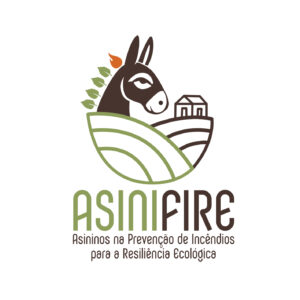
Identification & Background:
Name of the project: ASINIFIRE – Asinines in Fire Prevention for Ecological Resilience
Acronym: ASINIFIRE
Project description: The socioeconomic transformations that have occurred in recent decades in inland territories have led to profound landscape changes, whose consequences on the recurrence and severity of fires are exacerbated by climate change. ASINIFIRE aims to reduce the wildfire risk in peri-urban areas of rural localities within the Transboundary Iberian Meseta Biosphere Reserve (RBTMI) by developing a management model based on the environmental services provided by donkeys of the Miranda and Zamorano Leonese breeds. This model will integrate current grazing practices in shrubland and forests with innovative forest management practices using animal traction. To ensure its consolidation and sustainability, a transboundary network will be institutionalized to support the growth and promotion of these breeds, in alignment with UNESCO’s objective in establishing the RBTMI for sustainable development, harmonizing biodiversity conservation with cultural heritage.
Project code: PD24-00017
Starting date: 01/01/2025
Conclusion date: 01/01/2028
Total eligible: € 249.994,05
Promoters: CIMO – Centro de Investigação de Montanha do IPB
Copromotors:
AEPGA – Associação para o Estudo e Protecção do Gado Asinino
ASZAL – Asociación Nacional de Criadores de la Raza Asnal Zamorano-Leonesa, a BULEZA S. COOP.
Vimioso Municipality
ZASNET – Agrupamento Europeu de Cooperação Territorial
MORE CoLAB
Objectives
The ASINIFIRE project aims to develop a cross-border strategy in the RBTMI to promote the sustainable management of forest areas and the protection of assets and rural communities in the context of climate change. The proposal focuses on the implementation of grazing practices that enable fuel management, as well as the use of animal traction in forestry operations. These new applications contribute to the conservation and promotion of native donkey breeds and their habitat. The expectation is that by assigning new functions to donkeys, their population will increase.
The specific objectives of the ASINIFIRE project are:
– In situ implementation of grazing and fuel management practices in four habitat typologies within the RBTMI.
– Assessment of the efficiency of sustainable forest management using animal traction as an alternative to conventional, high-impact environmental models (forest habitat).
– Complementary promotion of donkeys through the creation of a cross-border network of stakeholders that identifies activities with economic and social potential, which can contribute to economic diversification and population retention in the region.
Activities
Activity 1: Installation of experimental and demonstration areas
Activity 1 comprises the selection and installation of experimental and demonstration areas.
Activity 2: Monitoring the results
Evaluating the impact of the action involves vegetation and soil parameters monitoring.
Activity 3 – Complementary valorization
This activity includes the creation of the Transboundary Network of stakeholders interested in the conservation and promotion of the Mirandes and Zamorano-Leonese donkeys
Activity 4 – Dissemination and awareness-raising
It includes network meetings, training courses, seminars, various publications, and communication at different levels.
Activity 5 – Administrative and financial management of the project
Expected results
The main outcome of the project is the development of a sustainable land management model based on the grazing of native-breed donkeys, which will simultaneously reduce the fire risk, increase the population of these native breeds and ensure the socio-economic sustainability of the RBTMI territory. This strategic model is built mainly on the results of the activities Creating the network and Identifying opportunities for diversification and associated economic activities, as well as training actions and Management plan for different types of habitat, which results from the monitoring activities. It should be noted that although this model was designed for the RBTMI, it is highly applicable to other territories in the Iberian Peninsula with similar contexts.
